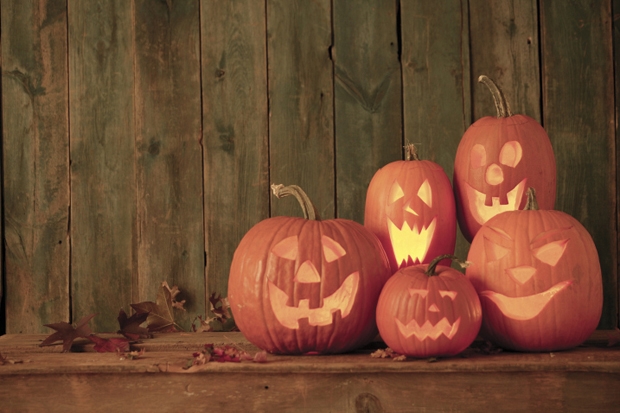I always dread Hallowe’en. It may have originated in Europe as a Christian celebration for remembering the virtuous dead and wishing them on their way to heaven, but its origins have been long forgotten. Now, more even than Christmas, it is a secular festival sustained by commercial greed. In its modern form, it is an American import, its main inspirations being Count Dracula and horror movies (and perhaps now also Harry Potter).
Hallowe’en is a time for the exploitation of children’s love of ghouls and magic and dressing up. Long before the day arrives, the supermarket shelves are stacked with pumpkins carved with the grimacing features of Jack-o’-lanterns, once meant to frighten away evil spirits, and with black witch’s costumes of cheap polyester fabric. Other symbols of Hallowe’en include skeletons, cobwebs and bats, all of them depressing.
But nothing equals the depression of the evening itself, when the doorbell rings time after time and groups of children, hideously attired, demand a ‘treat’ as an alternative to a ‘trick’. Maybe they never mean to trick you. Maybe it’s just an elaborate form of begging. But most people never wait to see what refusal of a ‘treat’ would entail, for they have furnished themselves in advance with supplies of sweets, coins or other goodies in order to hasten the children’s departure from the doorstep. Contributing to the gloom of Hallowe’en is its coincidence with the onset of winter and of the ghastly build-up to Christmas. From now on it will just be cold, darkness and futile extravagance.
The only thing to be said for Hallowe’en, really, is that it perpetuates the demonisation of the bat. I’m not saying that the bat deserves to be demonised. In some cultures it is revered. The Chinese, for example, believe that it betokens happiness and good fortune. But in the legends of the West it has always been a symbol of death, fear and evil.
There is no convincing reason for this. Of the 900 species of bat, for example, only three feed on blood, and none of these lives in Europe. The rest, including all the European ones, feed only on fruit and insects. Nor do bats make a habit of getting tangled up in people’s hair. Nevertheless, even from the early days of Christianity they were regarded as evil. Angels would be depicted with bird-like wings; demons with bat-like ones.
I read in a newspaper that a group of Church of England bishops and clergymen is now seeking to rehabilitate the bat, to re-brand it as one of God’s creatures, and to promote its conservation. It is claimed that bat numbers have declined dramatically in Britain during the past century, thanks to the destruction of its roosting sites and feeding grounds, and to the spread of pesticides.
Perhaps this is true, at least of some of its many species; but I come across bats all the time, sometimes in the bath or the kitchen sink, so there are certainly still a lot of them about. Yet the ferocity of existing bat protection laws, far exceeding any measures of which the bishops might be capable, are matched only by the intense dislike that most people feel for these odd little flying mammals.
It is already a criminal offence not only to capture a bat (which you certainly want to do if you find one in your bath), but also to damage or block access to a bat’s roosting place, even if this is inside your own house (and even if there’s no bat currently using it). If you want a steady and well-paying job, you should try to get one as a bat protection officer, for no alteration to any building in Britain can go ahead without a bat survey first being conducted there.
When some old bat droppings were found in an derelict bungalow that my Northamptonshire neighbour wanted to pull down, he was made to put temporary roosting boxes on some trees beside it, and to incorporate bat access routes into the roof of the new building with which he planned to replace it. Why should a new house not yet built be designed to accommodate bats as well as humans?
Whatever you think of bats, you won’t like them better if you have to pay to accommodate them in your own home. Pace the bishops, the most effective response to this scandalous imposition is probably to demonise them more.






Comments